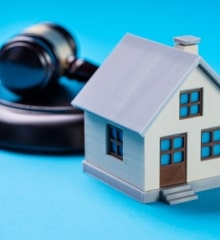Your house during bankruptcy. All your questions answered by Debstoppers

For many people, their home is their largest asset, so there are often questions about what happens to your house during bankruptcy. The experienced attorneys at Debtstoppers can help answer all your questions and guide you through every step of the process.
Can You File Bankruptcy and Keep Your House?
Yes, you can file for bankruptcy and keep your house, but if you’re able to keep it depends on several factors, including the type of bankruptcy you file, the equity in your home, and whether you can continue making mortgage payments.
Types of Bankruptcy
It is possible to keep your house if you file Chapter 7 or Chapter 13 bankruptcy, which are the two most common types of bankruptcy for individuals.
Do You Lose Your House in Bankruptcy?
Whether you lose your house in bankruptcy depends on several factors, including the type of bankruptcy you file, the equity in your home, and your ability to keep up with mortgage payments.
If I File Bankruptcy, What Happens to My House?
Most people who file for bankruptcy are able to keep their house, but it depends on the type of bankruptcy, how much equity is in the house, and the person’s ability to keep up with mortgage payments.
In Chapter 7 Bankruptcy
Chapter 7 bankruptcy is often called liquidation bankruptcy because it includes a liquidation process where non-exempt assets can be sold to pay your debts. However, most people filing for Chapter 7 keep their home if certain conditions are met.
Many people qualify for the homestead exemption, which allows you to protect a certain amount of equity in your home. Each state has its own laws governing homestead exemptions, and some states have more generous exemptions than others. If your equity falls below your state's exemption limit, you should be able to keep your home.
If your equity is covered by the homestead exemption, you’ll need to stay current on your mortgage payments to keep your house in Chapter 7. If you’re behind on payments, the lender can still proceed with foreclosure, even if the bankruptcy wipes out other debts.
Alternatively, you may be able to sign a reaffirmation agreement with your mortgage lender, where you agree to continue paying the mortgage even after your bankruptcy case is completed. This keeps the mortgage outside of the bankruptcy discharge and ensures you can stay in your home as long as you keep making payments.
In Chapter 13 Bankruptcy
Chapter 13 bankruptcy is a reorganization plan that allows you to create a repayment plan to pay back some or all of your debts over a repayment period of three to five years. Chapter 13 is often the better option if you want to catch up on missed mortgage payments and keep your house.
Chapter 13 immediately stops foreclosure proceedings as soon as you file, giving you time to work out a repayment plan. Unlike Chapter 7, in Chapter 13, the bankruptcy trustee does not sell your assets. Therefore, as long as you follow the repayment plan and stay current on your mortgage, your home’s equity does not come into question unless it affects your ability to repay your debts under the plan.

How to File Bankruptcy and Keep Your House?
Simply put, filing for bankruptcy can help you manage overwhelming debt and in many cases, you can still keep your house.
If you file for Chapter 7 or Chapter 13 bankruptcy, it is possible to protect your home, depending on factors like your home equity, the type of bankruptcy, and your ability to keep up with mortgage payments.
Choosing the right bankruptcy chapter for you
Given the complexity of bankruptcy law and the difference in state law, it’s wise to consult an experienced bankruptcy attorney to help you determine the right bankruptcy chapter.
State exemptions
State law varies greatly. Some states allow for a larger homestead exemption but it’s important to understand the laws in your state.
Contact us
The experienced bankruptcy attorneys at Debtstoppers can help answer your questions, evaluate your specific situation, and help you proceed.
Consulting with a bankruptcy attorney before filing can ensure you understand how bankruptcy will impact your ability to keep your home. A lawyer can help you determine which type of bankruptcy is best for your situation, whether your home’s equity is protected, and how to navigate the bankruptcy process while protecting your assets.
Can You Buy A House After Bankruptcy?
Yes, you can buy a house after bankruptcy, but it requires time, planning, and a strategy to rebuild your credit. While bankruptcy may impact your ability to get a mortgage, it does not permanently prevent you from buying a home.
Lenders are often willing to work with people who have filed for bankruptcy, but there are waiting periods and steps you’ll need to take to improve your financial profile before applying for a mortgage.
How Long After Filing Bankruptcy Can You Buy A House?
The waiting period to buy a house after bankruptcy varies depending on the type of bankruptcy you filed and the type of mortgage you need. For Chapter 7, the typical waiting period is two to four years, while for Chapter 13, it can be as short as one year if you’ve made timely payments.

How to Buy a House After Bankruptcy Chapter 7?
You can buy a house after filing for Chapter 7 bankruptcy, but it requires patience and careful planning. After waiting for the required two to four years, focus on rebuilding your credit, saving for a down payment, and ensuring you have a stable income.
Government-backed loans, like FHA and VA loans, offer more flexibility for buyers recovering from bankruptcy. By taking these steps and working with the right lender, you can buy a home and secure favorable mortgage terms after Chapter 7 bankruptcy.
How To Rebuild Credit Quickly?
Rebuilding credit after bankruptcy can take time, but with the right strategies, you can improve your credit score more quickly and regain financial stability.
After your bankruptcy is discharged, make sure that all your bills are paid on time. Payment history accounts for 35% of your credit score, so consistently paying all your bills on time is critical to rebuilding your credit.
One of the best tools for rebuilding credit quickly is a secured credit card, which requires a cash deposit that acts as collateral and becomes your credit limit. Make sure to pay off the balance in full to demonstrate responsible credit use; after several months of responsible use, some secured card providers allow you to upgrade to an unsecured credit card.
Likewise, a credit-builder loan can help you rebuild credit by establishing a positive payment history. Make sure you keep your overall credit utilization low; ideally, aim for less than 30% utilization. Also having a diversified credit mix can help boost your credit score.
While you may want to re-establish credit, applying for too many credit accounts can harm your credit score. Each time you apply for a loan or credit card, a hard inquiry appears on your credit report, which can lower your score. Ultimately, focus on quality credit by maintaining one or two secured credit cards or loans with responsible payment histories.
Rebuilding credit after bankruptcy takes time, but the key is consistency. With patience and consistency, you’ll be able to rebuild your credit and move toward a stronger financial future.





